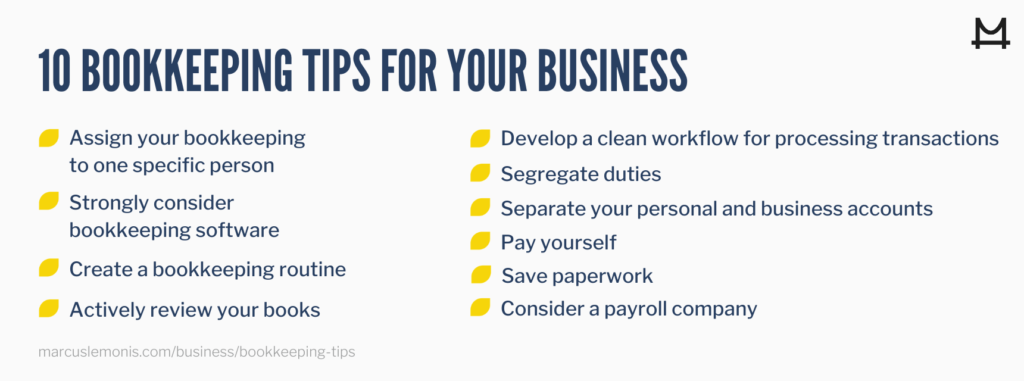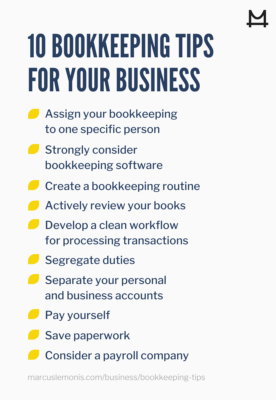When you hear the term “bookkeeping,” you might think it’s all about the numbers. In a sense, you’d be exactly right. But if you want those numbers to be accurate, the process actually starts with your behaviors. You need an airtight system for tracking everything. And further, that system needs to be consistent, reliable, and built for success. This is an article that helps you work towards that system. You’ll read about a few bookkeeping tips that make the process feel clear and manageable. But most importantly, you’ll be one step closer to adopting Marcus Lemonis’ “Know your numbers” philosophy. Because it’s like Marcus always says, “If you don’t know your numbers, you don’t know your business.”

The Importance of Knowing Your Numbers
Each year, you probably go to see your doctor for a physical. You don’t schedule that physical because you’re aware of some pressing issue. You go as a form of preventative maintenance. Your doctor will take a look at a few things, ask probing questions, then notice some areas for improvement. They might ask you to exercise a little bit more, start taking iron supplements, or keep a close eye on how your throat feels. But taking stock of things helps them figure out what you need to adjust, and from there, they can create a game plan to improve your overall health.
Your company needs to get similar checkups, but instead of a doctor looking at your chart, you’re looking at your books. How are your margins? What’s your cost per unit? How much of that cost is materials? How much is labor? How much do you spend on marketing to reach new customers? Bookkeeping helps you answer all of those questions, and in turn, assess the financial health of your company. You’ll get a sense for where you stand, what you can work on, and come up with a plan for getting even healthier. So, while a lot of people think of bookkeeping as “accounting,” push yourself to think of it as part of “operations.” Because in a sense, that’s where your operational health begins.
Now, let’s take a look at a few bookkeeping tips that give you numbers you can rely on. That’s how you give yourself the type of checkups that actually make your company healthier.

10 Bookkeeping Tips for Your Business
Assign Your Bookkeeping to One Specific Person
There’s an old saying that goes, “When you assign something to everyone, you assign it to no one.” That’s a great mindset to bring into your bookkeeping process. If you have too many cooks in the kitchen, sometimes things get done twice. Other times they never get done at all. You end up with a lot of confusion about where one person’s job ends and where the other begins. So, assign your bookkeeping to one specific person. That will help clarify the expectation and create accountability.
You’ll also make it easier to get your questions answered when you’re trying to track down that one specific transaction a few months later.
Strongly Consider Bookkeeping Software
You might be able to get by with a spreadsheet in a few select cases. Let’s say you’re a single-member LLC and do graphic design.

You don’t pay any employees, buy inventory, or do much purchasing. In that case, a spreadsheet might work out just fine. But as your business grows and develops a few moving parts, you definitely want to consider bookkeeping software, like Quickbooks. Are you wondering what you should track? Do you have questions about the level of detail? Quickbooks suggests something called a “Chart of Accounts,” which is all of the typical transactions you’ll want to make sure to record. It can also generate a lot of your accounting reports at the touch of a button. So, instead of wrestling with creating your own income statement, let your bookkeeping software handle this in a matter of seconds.
Create a Bookkeeping Routine
Marcus is always big on process, and when it comes to bookkeeping tips, his advice is no different. Set a time when you consistently do all of your bookkeeping. From there, make sure you really prioritize it. Maybe you do your bookkeeping from 4:00 – 5:00pm every single day. Maybe you do it for the entire day on Fridays. But whatever the case, be proactive. Stay on top of things.

When a transaction rolls in, that’s pretty manageable, right? How about two transactions? Of course it’s manageable. You’ve definitely got this. But let’s say you only do your bookkeeping every month. That pile of papers can start to look a little chaotic and it’s tougher to sort out. So, make sure to get on a consistent routine. It breaks everything into snackable chunks and ensures you’re operating on up-to-date information.
Actively Review Your Books
Sometimes people get so hyper-focused on the tracking piece that they tend to slip on some of the analysis. That’s okay. It happens.
But similar to the above, set a routine for reviewing your books and really stick to it. See what you can learn. You’re really hoping to draw actionable insights. If you spot a challenge, a consistent review helps you confront it head-on. When you spot a few things you’re doing great, now you can make sure to emphasize those things going forward. Bookkeeping tips aren’t just about knowing your numbers. They’re also about understanding what they have to say.

Develop a Clean Workflow for Processing Transactions
If you’re like a lot of businesses, there’s always a lot happening in a few different corners of the universe. But the left hand needs to know what the right hand is doing.
Make sure you develop a coordinated approach. You’re hoping to avoid a scenario where everyone is operating on an island. That could lead to people making purchases without an understanding of your overall cash flow and budget. It could also lead to managers doing work that no one ever bills for.
Those are both just examples and would never happen at your company. But you can see how there’s value in creating a cohesive process for making requests, approving those requests, releasing the money, and recording everything along the way.

Segregation of Duties
When you’re developing the process mentioned above, be aware of a best practice known as “the segregation of duties.” This just means that you’re separating a few sensitive functions. For example, let’s say you have one employee who does it all. They have access to your checking account, issue the payments, and then record all of those transactions. That might sound efficient at first glance, but it’s also very susceptible to fraud. They could essentially write a check to themselves, then disguise it. Of course, you’ll probably never need to worry about that. But your partners and investors will love that you’re thinking along these lines.
You’ll send them a powerful message that you’re treating their money with care. So, when you’re thinking about bookkeeping tips, consider a flow that’s a little compartmentalized. You might have one employee submit a request, a different person who approves it, then you personally release the funds yourself, and your bookkeeper records it all along the way. Your accountant will most likely insist on these types of checks and balances as well, and may even have a suggested process for your company to follow.

Separate Your Personal and Business Accounts
You definitely want to separate your personal and business accounts for a few important reasons. First, that’s the only way you can get a real sense for your company’s financial health. If you co-mingle your business and personal accounts, you muddle your company review. Second, it’s a regulatory thing. You’ll need to do filings with a few different government entities, then pay the appropriate taxes. The only way to make sure you’re meeting those obligations is by isolating all of your business transactions. Third, if your business truly operates as a separate entity, you’re offered the full legal protections given to companies.
But if that line starts to blur, you jeopardize those legal protections. So, while you could technically file this sort of diligence under “bookkeeping tips,” some people might even call it “bookkeeping 101.”
Pay Yourself
Companies pay people, which sounds obvious at first glance. But surprisingly, a lot of small business owners forget to pay themselves. When you pay yourself a consistent salary, you legitimize your company in the eyes of the law and preserve all of your corporate protections. That means if someone sues your company, they can’t go after your personal assets, which is huge for limiting your risk. Paying yourself also gives you a real look at your business model. How viable is it? Is your company actually making money? Or does it only appear that way because you haven’t been taking a salary yet? Foregoing a salary forever isn’t sustainable. So, you want to make sure that you pay yourself, get a real sense of where your company stands, and make sure you’re creating a business model that’s built to last.

Save Paperwork
Mitch Hedberg, the famous one-liner comedian, had a classic bit about saving the receipt for a doughnut, joking “I can’t remember a scenario where I’d have to prove that I bought a doughnut.” But as funny as that is, you actually do want to save everything as part of your bookkeeping effort because it can actually save you money. Let’s say you want to write off some office furniture on your taxes. You need receipts in order to do that. You’ll also need to save those receipts in case you ever get audited. Does that sound overwhelming? Great news. It doesn’t have to be. Most bookkeeping software has a place to scan and store receipts. So, it’s been getting really painless to save all of your supporting docs.
This next piece flows from the above, but always, always, always request paperwork. If you agree on a certain price over the phone, that’s great. But take that extra step and request an actual purchase order. You have a thousand things to keep straight, so once you get everything in writing, it’s one less thing to worry about.
Consider a Payroll Company
Your instinct to handle everything yourself is great. In fact, it’s probably saved you a lot of money over the years. But payroll companies are surprisingly affordable and usually well worth the cost. They keep up with the latest taxes, withholding requirements, and prepping the right forms for tax season. They also help set up direct deposit and retirement plan contributions. But more than anything, they’re saving you time. They help you put the payment process on cruise control, so you can get a little more admin off your plate, and move on to all those other things that you do best.


Keeping your company’s books might sound a little foreign at first. But once you have a clear process, all of a sudden it starts to sound really clear and manageable. Pay special attention to who’s doing what. Give some real thought to using software. Then make sure to fold the rest of these bookkeeping tips into your process as well. Like any good book, your company’s books hold a ton of lessons. But those lessons are only as good as your numbers. So, make sure you take the time to get your bookkeeping right. Because it’s like Marcus always says, “High performance, high reward.”
This article is informational only and subject to errors or omissions. As with any legal or regulatory advice, please consult your legal counsel or tax advisor to make sure you are in compliance with all and any federal, state, city or county rules and regulations. More
- How does your business currently keep track of their numbers?
- Which tips from the above can help in your bookkeeping?





